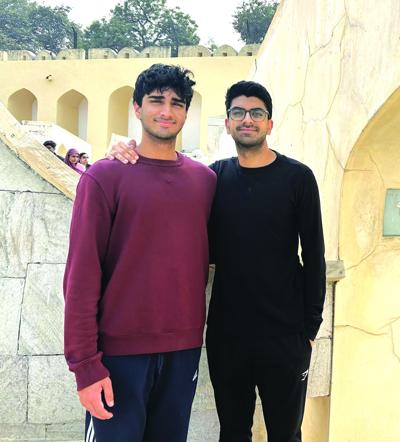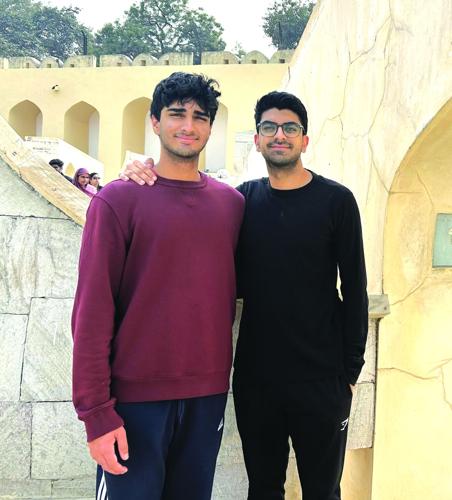A pair of Scottsdale brothers have launched an online site to help address what they consider an oft-forgotten part of the nation’s dining scene: people with disabilities.
Sanjit Krishnamurthy, a 16-year-old Brophy College Prepatory junior, and his brother Rohit, a Brophy grad who is a strategic financial analyst for Uber, recently launched the Beta version of dineabiliti.com.
Describing themselves as “passionate about leveraging technology to create a more inclusive world,” the brothers created the free artificial intelligence-driven site to help people with disabilities find accessible restaurants.
“Did you know that it is incredibly difficult for disabled patrons to plan for restaurant visits?” asked Sanjit. “My cousin was diagnosed with Duchenne Muscular Dystrophy at 10 years old and over the last 15 years, he has been dependent on a motorized wheelchair, service dogs, and a great support system.
“I have seen first-hand, many activities that we take for granted such as dining out at a restaurant, require significant planning for people with disabilities.
“Every new restaurant visit takes hours of planning often resulting in disappointing experiences,” he continued. “Is the restaurant’s wheelchair ramp access close to the parking? Is the entrance truly wheelchair accessible, as indicated on their website? Do they welcome service dogs? How does the restaurant staff treat individuals with disabilities?”
Their project started about 18 months ago when Rohit, a Brophy grad who earned a degree in economics from the University of California/Berkeley, went to visit that cousin in Boston and were shut out of a rooftop restaurant.
“The ‘wheelchair accessible’ entrance touted by Google Maps turned out to be a narrow service elevator through a crowded kitchen,” Sanjit said.
Though their cousin said “this was a common occurrence,” Rohit was so shocked that when he came back home, “we both decided to find a solution,” Sanjit said.
“Turns out there are about 60 million people in the US who have mobility, hearing or vision issues that are impacted by this. Activities that we take for granted, such as dining at a restaurant, require significant planning for these individuals.
“After scanning through thousands of reviews on Yelp and other platforms, we found that there are few first-hand reviews relevant for disabled individuals planning to visit restaurants,” Sanjit explained. “We realized that the challenge is to find these relevant reviews.”
Sanjit learned visual coding in grade school and an AI programming language called Python in middle school. Before even starting high school, he earned data science certification at the Pragmatic Institute, where he was the only high school kid among master’s and PhD students.
So it’s not surprising that to start the project, he created a web scraper.
It scrapes and analyzes firsthand reviews from restaurant patrons from public websites, and extracts relevant insights on accessibility features, such as wheelchair access, service for patrons with service dogs, and amenities for visually or hearing-impaired individuals and summarizes the sentiment in 25-to-30-word paragraphs.
After pulling the information together in a rudimentary format. the brothers, sons of Harish and Jaya Krishnamurthy, enlisted a professional company to design and create the current website.
The brothers split their duties with the website.
While Rohit focuses on all the financials and marketing activities for Dineabiliti, Sanjet said, “I focus on the AI, coding and technical development.
“We work closely together on overall idea for Dineabiliti, the strategy, partnerships and execution,” he added.
The website is designed to provide information accessibility quickly; a user just enters a restaurant’s name to see if it’s accessible or look at the map and click on any restaurant to see their disabled-relevant reviews.
But as Sanjit stressed, the site is still in it Beta stage for several reasons.
“We pulled info for about 1,000 restaurants in the Phoenix metro area,” he said. “I believe there are about 3,500 restaurants in Phoenix and probably a lot more in Maricopa County. Arizona in total has about 12,000 restaurants.
“We know there are more restaurants in these areas and plan to update soon.”
He said he and Rohit also plan to add more functionality to the website “but we want to get people using it so they can provide feedback that we can use to update the website and AI programs.”
While noting that many first-hand reviews on Google and Yelp are “specifically around accessibility,” Sanjit also said they’re difficult to find.
Hence, “finding and analyzing the reviews that are relevant to accessibility and service animals is the challenge.”



